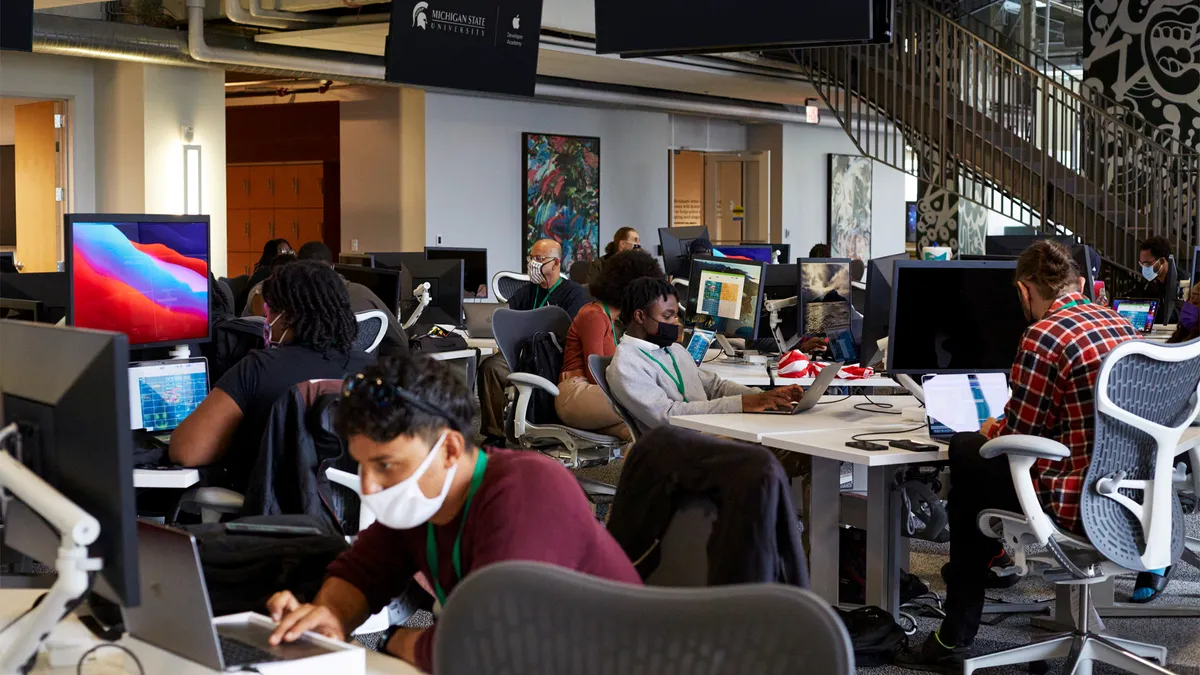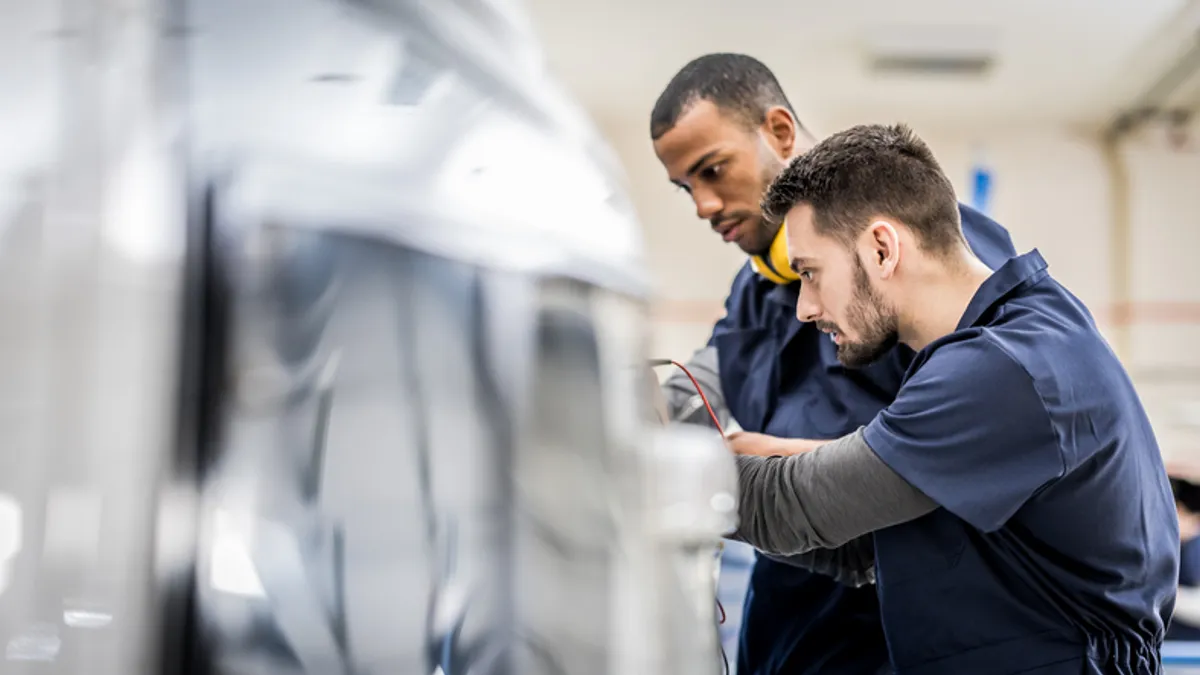Rolando Sanchez gave his students at Northwest Vista College (NVC) a challenge: record a minute-long speech pitching an idea to a hypothetical senior executive and then a second one pitching the same idea to that person's teammates.
"Sell the idea to the senior executive, and persuade the teammates to have them agree to work together to bring the idea to fruition,” explained Sanchez, who teaches economics at NVC (top image), one of five community colleges in the Alamo Colleges District in San Antonio, in an interview with HR Dive's sister publication Education Dive.
Over three months, Sanchez guided the 51 students through that and other exercises designed to teach them the real-world skills needed to earn an "Initiative badge" — a microcredential akin to a mini specialization.
"It's one thing to say you're a self-starter and another to actually pull out an Initiative badge; or to say 'I'm a great communicator' versus possessing an Oral Communication badge," Sanchez said. He teaches both badges to NVC business and economics students.
Microcredentials are a trend du jour in U.S. higher education, and while tech-related ones are still the most popular, those pertaining to so-called "soft" skills — such as initiative, oral communication, resilience, empathy and critical thinking — form a considerable share of the offerings.
That's at least in part because multiple recent studies cite company executives lamenting the lack of such skills in the recent college graduates they hire. Many colleges around the country have begun to offer soft skills badges, either as new courses or by embedding them into existing curricula.
"I don't like to use the phrase 'soft skills' because that makes them sound less important, while in fact, they are the most important skills cited by employers," said Kathleen deLaski, founder and president of Education Design Lab (EDL), a Washington, D.C.-based nonprofit that created the Initiative and Oral Communication badges used by NVC.
'The workplace is changing'
DeLaski is on the money.
Several recent surveys suggest employers aren’t finding employees with strong soft skills at the rates they’d like.
Four out of five employers said written communication skills were what they wanted to see most on students' resumes, according to the National Association of Colleges and Employers' 2019 Job Outlook survey.
Meanwhile, 40% of recruiters found job candidates lacked communication skills, while 30% said the same of critical thinking skills, software firm Ellucian reported in a survey of students and recruiters this year. Students polled said they were seeking these two skills at the highest rates, however.
Other skills employers want to see include problem-solving, adaptability and time management, per 2017 research by recruiting provider iCIMS.
"The workplace is changing, jobs are changing and the change is more than technological," Katie Lynch-Holmes, principal strategic consultant at Ellucian, told Education Dive. "Yes, technology is driving or forcing that change, but the requirements (of employees) are more and more human."
She cited skills such as team-building, leadership potential and conflict resolution as particularly in demand. "All these have become elevated in importance and become the true differentiator when hiring, even as we have tech taking over the more mundane tasks."
That's why when deLaski's EDL began to develop soft skills badges four years ago, it decided to call the eight credentials it developed, "21st Century Skills badges." They are: Collaboration, Creative Problem Solving, Critical Thinking, Empathy, Initiative, Intercultural Fluency, Oral Communication and Resilience.
"We had a lot of discussion about what to call these skills and we discussed the future of work, how work was becoming more complex, networked and dynamic and therefore required a broader range of skills to manage information, people and teams across data sets and solve problems," deLaski said. "These were all 21st-century challenges."
And in true 21st-century fashion, they have a digital footprint. Those who earn EDL's get a digital certification that can be added to their LinkedIn profile and found via searches for different skill sets.
Bringing in the badges
George Mason University was one of the first colleges EDL worked with to translate informal learning into measures that resonate with employers.
"They were seeing that 95% of learning was happening outside the classroom, but students' resumes were not demonstrating them," deLaski said.
It is one of a dozen colleges and universities EDL has worked with over the years to design and implement its 21st Century Skills badges. Overall, 800 institutions, many of them colleges and universities, have signed on with EDL to offer badges via a tool kit that it developed a year ago. Institutions will adapt the teaching format and performance assessment tools developed by EDL to their classroom settings and specific courses.
Each badge breaks down into four sub-competencies. The Empathy Badge rewards students' ability to "listen actively" and "identify others' needs and values," while the Initiative Badge rewards the ability to "lead without a title" and "act as a catalyst," for example.
EDL also helps colleges evaluate students' performance in each of those areas to verify they are eligible for a badge. For instance, a rubric encompassing lists of criteria and expectations for each sub-competency must be completed and evaluated by the instructor to earn a badge.
George Mason offers the Resilience badge to undergraduate and graduate students through a five-session workshop with a mix of on-campus and online meetings. Its four sub-competencies are: learning from experience, exhibiting flexibility, demonstrating self-awareness and focusing on solutions.
"I don't like to use the phrase 'soft skills' because that makes them sound less important, while in fact, they are the most important skills cited by employers."

Kathleen deLaski
Founder and president, Education Design Lab
In an article on George Mason's website, students who took the badge indicate they found the topic to be an important skill to learn to navigate college, which requires juggling academics and other activities.
In Smithfield, North Carolina, Johnston Community College is using the Intercultural Fluency badge in a cultural immersion course for students studying to become Spanish language interpreters.
The badge aims to train and assess students in four sub-competencies that EDL defines: recognize and challenge one's own cultural biases; show curiosity; demonstrate self-awareness; and incorporate diverse perspectives.
Josh Sanderson, who teaches the course, said the badge gelled nicely with the Spanish Interpreter program because the course "focuses a lot on understanding cultural differences and being able to work in diverse situations."
It can be easy for students to lump together all of the 20 or so countries where Spanish is the official language, he said. "Through learning for this badge, students were able to see differences across and even within countries and appreciate diversity within a language and a culture," he added. "The discussions were very lively and there was a lot of participation."
Standardization needed
While there appears to be broad consensus that employers are demanding workers with strong soft skills, the jury is out on whether microcredentials are the best way to teach them. Because they are so new, little research has been done to gauge student outcomes or employers' response.
But the market is growing. As it is, there are close to 750,000 unique credentials on offer in the U.S., including microcredentials and certificates, Scott Cheney executive director of the nonprofit Credential Engine told Education Dive last month.
However, not all meet the same standard. That's something his organization is hoping to better parse by developing a national registry to track credentials and coming up with a common language in which to talk about them.
"We do need a way to increase the validity of credential certifications across the board," said Ellucian's Lynch-Holmes. "We need a way to standardize what they mean so learners and employers both know what they're getting and its value."






















